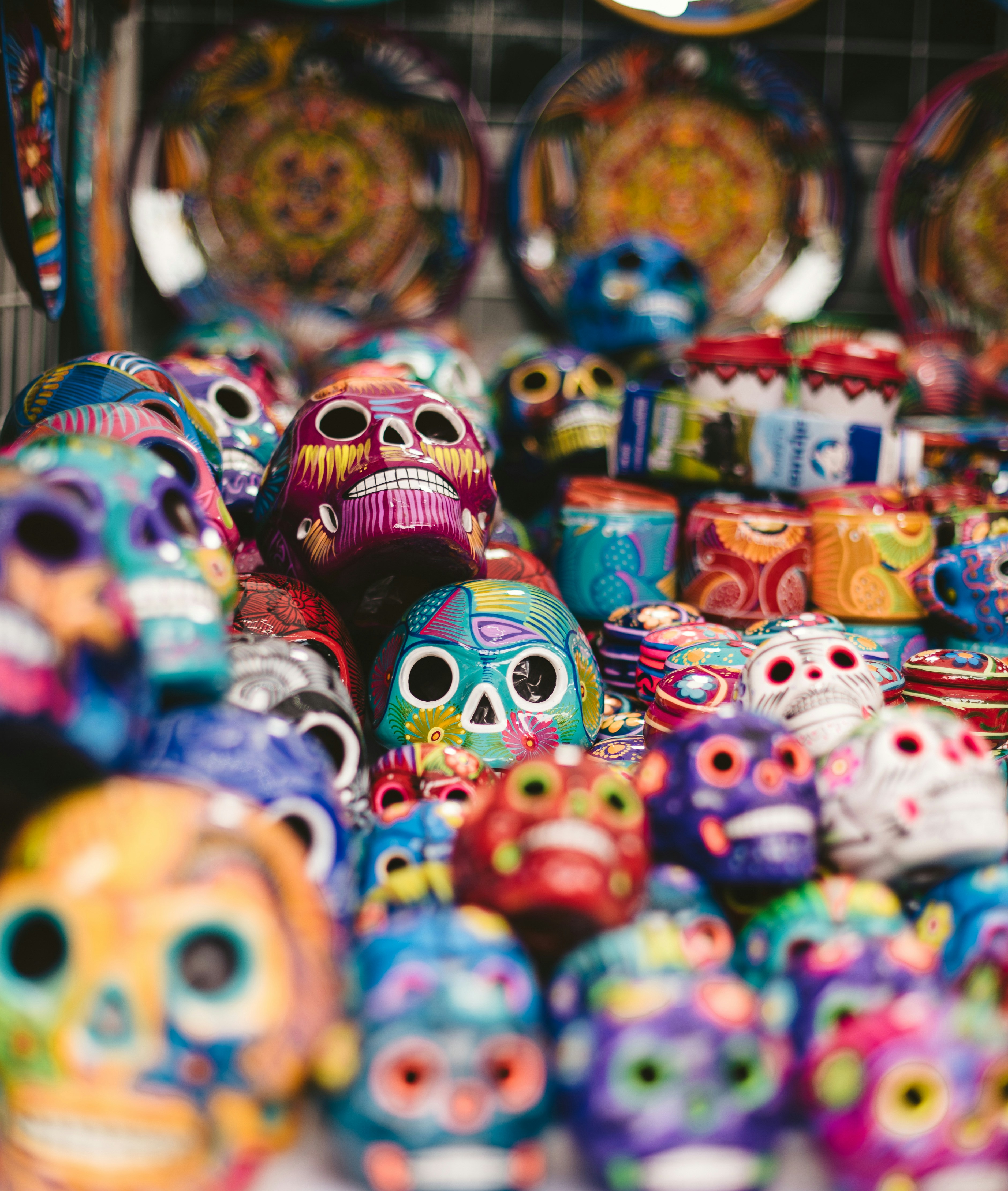As I've started on the (very) basic steps of learning Russian and Spanish, I found myself absolutely in love with the feeling of picking up new words and phrases. After all, they're not just words, they're a language, a belief system, a culture. But most of the time, when people talk about language learning, they have the same tone as somebody talking about doing homework or reading an old, classic book—just to seem smart. But learning languages is about so much more than academics!
Have you ever wanted to travel? Wanted to see the world? Languages are like a mirror into another world—different cultures can impact your thinking, your writing, and what you're consuming.
Instead of looking at things from a Eurocentric (or wherever you're from) lens, you can start to see things from the perspective of the world. And if you're a writer, you'll have a whole new set of words available to you, like new tools that help you build a new audience.
Here is a quick overview of some beautiful languages that you might want to pick, as well as a guide on how to pick your own.
Let us slide into your dms 🥰
Get notified of top trending articles like this one every week! (we won't spam you)Spanish
If you live in the U.S, this is probably the first language you think of when you think of foreign languages. More people speak Spanish in America than any other foreign language! In fact, American Spanish speakers amount to around 43 million!
Thankfully, it is fairly similar to English and easy to grasp. The two big things to get used to are conjugated verbs (similar to -ing or -ed in English, the ending of verbs change based on the WHO of Spanish), and masculine/feminine words.
Why you should learn it: it's incredibly useful! I cannot even list the amount of different, unique countries that use this language. It's also quite possibly one of the prettiest languages to hear—every word has this special ring to it, this special, lyrical sound.

Image Credit: Jeremy Lwanga from Unsplash

Take the Quiz: Which Language Should You Learn Next?
Want to learn a new language, but don't know which one to pick? Take this quiz and find out!
Portuguese
This language is dialect-wise similar to Spanish—in fact, some Spanish speakers can understand Portuguese solely through context clues! That said, it is its own, unique language, with its own culture and norms. It is also abundantly useful, spoken in a ridiculous amount of countries: and hey, haven't you always wanted to visit Brazil and South America?
Why you should learn it: first, it's gorgeous. Have you ever heard a Portuguese accent? Second, it opens up a whole new set of countries, and it's actually one of the easier languages for English speakers.

Image Credit: Agustin Diaz Gargiulo from Unsplash
Russian/Slavic Languages
I added the Slavic languages part because there are simply so many Eastern European languages that I would not be able to list them all. Some are similar to Russian in terms of the script and words, such as Ukrainian, while some, such as Romanian, don't even use the same alphabet! (I will get to Romanian later, though.)
As far as Russian goes, while I wouldn't describe it as incredibly difficult to learn, it will be very hard to get used to because it functions in such a different way than English. While word order is not particularly important, and words like is, are, a, or the are just completely missing (usually), which can make some aspects WAY easier, and the letters are very easy to memorize, Russian has a system of cases that are pretty complicated.
Basically, in place of a strict word order, the ending of Russian nouns and adjectives follow specific rules that help you determine the who, how, and what of a sentence.
Why you should learn it: first, literature. Russian literature is known throughout the world. Secondly, it introduces you to a whole new culture and language, with a beautiful, mysterious script and a complicated history. Also, a TON of people speak it.

Image Credit: Olga Kolavski from Unsplash
Hebrew
While Hebrew is not a lot of countries' main language, its significance in the Jewish faith and in history makes it a wonderful language to study. It has a unique, complex alphabet, and carries an aura of mystique and culture. It is one of the oldest languages still alive, and this reason in itself makes it an extraordinary language to learn. You will have the ability to study ancient texts and understand past events in a new light.
Why you should learn it: religion, history, and culture!

Image Credit: Marie Bellando Mitjans from Unsplash
Latin
Another extremely old language, this one is generally not used today. However, that doesn't make it useless! Far from it, because the English language, as well as many other Romance languages, are based on it. You will increase your vocabulary, and it will be easier to study other languages that originated from Latin!
Why you should learn it: history and vocabulary! Also...it makes you seem smart!

Image Credit: Adrian Dascal from Unsplash
Arabic
I used to dream of learning Arabic, with its gorgeous manuscript and mysterious, complex lettering system. Be warned, though, Arabic is considered very difficult to learn, and even its basic spelling and grammar system is very different from English or Romance dialects.
Arabic will, however, open up a huge range of opportunities for you to understand and communicate with Middle Eastern or Islamic peoples. It is spoken in a wide variety of predominantly Islamic countries, and Classical Arabic (a more complex, ancient form of Arabic), is the language of the Quran, the Muslim holy book. But, regardless of whether or not you believe in Islam, Middle Eastern cultures are incredibly deep and rich, filled with gorgeous, bejeweled clothing, dreamlike traditions and festivities, and amazing food.
Why you should learn it: to better understand Islam, to talk to new people, to learn about a new culture.

Image Credit: Yana Petkova from Unsplash
Italian
A romantic, passionate language, the country of Italy itself is known for its lovely visions and stunning scenery. Italian is a romance language very similar to Portuguese and French, making it a relatively easy language to master for a native English speaker. It is also extremely similar to Spanish! Its pronunciation is fairly simple compared to English.
Italian is the official language of music, and a language well associated with choral and classic melodies, luxury, and of course, the incredible cuisine.
Why you should learn it: ever wanted to go to Italy? Well, this will certainly help you. Also, the ability to better understand music!

Image Credit: Jack Ward from Unsplash
French
An elegant, poetic language, French is filled with sophistication. The official language of ballet, it is a great language to learn if you are interested in arts or culture. France is also known for its involvement in fashion, especially high couture, winery, and farming. This language is also spoken in many countries other than France, such as Belgium, Switzerland, and Nigeria!
Why you should learn it: many consider it one of the most beautiful languages, and it will expose you to arts and culture!

Image Credit: Bastien Nvs from Unsplash
Swahili
Apart from Arabic, Swahili is the most common language of the African continent, most prevalent in East and Central Africa. It shares the same script as English and other Romance languages, though in previous times it maintained the same script as Arabic and Urdu. However, Swahili is a Bantu language, not a Romance language, and shares very few other similarities to the English language.
If you have African roots, many say learning Swahili or another African language has helped them connect with their culture and heritage. Many find Swahili to be melodic and poetic, as well as relatively simple to learn.
Why you should learn it: plan to travel to a Swahili speaking country? Connect with your roots? Just be exposed to a whole new culture?

Image Credit: Guisi Borrasi from Unsplash
Japanese
My brother is currently learning Japanese, and he is OBSESSED. If you think about it, parts of Japanese culture may already be a part of your life, if you enjoy anime, manga, K-Pop/J-Pop, or Japanese shows. (K-Pop very often involves the Japanese, Thai, and English languages as well as Korean.) Japanese has a complex but beautiful script, and the culture is filled with incredibly interesting art (ESPECIALLY the pottery!) and folktales.
Learning Japanese is also very helpful for practical reasons. Around 125 million people speak Japanese, and Japan is filled with wonderful attractions and tourist sites if you ever want to travel.
Why you should learn it: to consume its media, to learn about East Asia, for fun!

Image Credit: Sora Sagano from Unsplash
Turkish
The reason I included Turkish on this list is because it is used in an Islamic language (though it originates from Central Asia), and is fairly easy to learn, and does not require learning a whole new script! Of course, while it is also its own culture, it's also just very pretty to hear.
If you want to learn Turkish, learning the word order and vowel harmony would likely be the trickiest part. However, it is a pretty logical, straightforward language, and when you get the hang of it you should be fine!
Why you should learn it: it could connect you to Turkish culture, Islamic culture, and is pretty easy to learn.

Image Credit: Fatih Yurhur from Unsplash
Romanian
I LOVE Romanian culture. No kidding, if I could magically know any language, it might just be Romanian. Gothic and spooky, and filled with folktales and villages, it's gorgeous and incredibly interesting.
The connection to vampire folklore is a big one—Romania and other Eastern cultures are the origin of the myth. It's also filled with mythical castles, as well as old churches. Want to travel there? Be sure to check out the Black Church and other architectural miracles.

Image Credit: Alisa Anton from Unsplash
Indian Languages
I chose not to focus on a specific Indian language because of the sheer abundance of languages there—24 official and hundreds more dialects and languages! Most Indians are used to hearing a blend of languages in the street, and Indians are adept at language learning. The constant exposure leads you to pick things up. As a person of Indian descent myself, I've heard that nearly every state has its own language, and knowing Hindi and English is also necessary to survive!
Hindi is the most common language in India. Other common languages include Gujarati, Urdu, Tamil, and Bengali.
Hindi's lettering is very interesting. Vowels are not their own letters, (except in the beginning of words), but are rather attached to consonants with a distinctive mark such as a line or an arc. It also involves half letters, which are exactly what they sound like.
Gujarati is primary to the state of Gujarat, and utilizes the same script as Hindi. Urdu is incredibly similarly spoken to Hindi (I understand a little Hindi, and for the life of me I cannot distinguish it from Urdu.) However, it uses the Arabic lettering.

Image Credit: Bulbul Ahmed from Unsplash
Other languages to keep in mind:
Korean: tons of people use it, and you're probably also familiar with K-pop or Korean skincare.
Chinese: this is one of the most spoken languages of all time, and you're probably already seen Chinese fashion trends or Douyin makeup.
Farsi (also called Persian): with the same letters as the Arabic alphabet, but relatively simple to learn, it is a good introduction to Arab culture.
I hope you enjoyed this article! If you want to start learning a language, there are many tools available. Duolingo can teach you the very basics and help you gain comprehension skills, and YouTube/audio tapes can help you grow that comprehension.
Learning lettering is very important, as reading is a great way of gaining vocabulary. Most importantly, remember to have fun!














